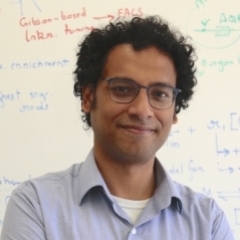
Arnab Mukherjee
Associate Professor
Chemical Engineering and Bioengineering
Contact
University of California, Santa Barbara
Santa Barbara, CA 93106-5080
Fellow, Scialog; Discovery Award from Dept. of Defense Peer-Reviewed Medical Research Program; NIH R35 Maximizing Investigator's Research Award; NARSAD Young Investigator Award, Brain and Behavior Research Foundation
Research
Mukherjee's ability to visualize biological activity inside living cells relies almost exclusively on genetically encoded light emitting proteins such as the green fluorescent protein (GFP) and luciferase. However, practical application of these bioluminescent proteins is often constrained by two transport restrictions that are a major factor in vivo: the limited diffusion of oxygen, which is an essential substrate for light emission; and the inability of light to access deep, opaque tissues. For these reasons, low-oxygen biological systems (e.g., the gut microbiome) as well as preclinical models of disease, injury, and therapy in optically opaque animals have remained largely “invisible” to investigations using existing biomolecular tools.
To address these challenges, the Mukherjee group will pursue fundamental advances at the intersection of molecular biology, biomedical imaging, and biophysics to discover and repurpose new classes of biomolecules into genetic reporters for studying cell function under low-oxygen conditions and inside deep tissues. Specifically, the group will explore biomolecular materials with interesting properties such as paramagnetism, photoreception, and water diffusion. Using advanced protein engineering techniques such as directed evolution, the Mukherjee lab will turn these proteins into “molecular spies” that can transduce biochemical signals inside a cell into an oxygen-independent optical readout (for fluorescence imaging) or a deep tissue-penetrant magnetic resonance signal (for magnetic resonance imaging). The biomolecular agents developed in the Mukherjee lab will be useful for studying a wide range of problems encompassing cancer, neurobiology, degenerative diseases, infections, biomechanics, anaerobic microbiology, and immunotherapy.
PhD University of Illinois at Urbana-Champaign
BS Indian Institute of Technology, Madras
